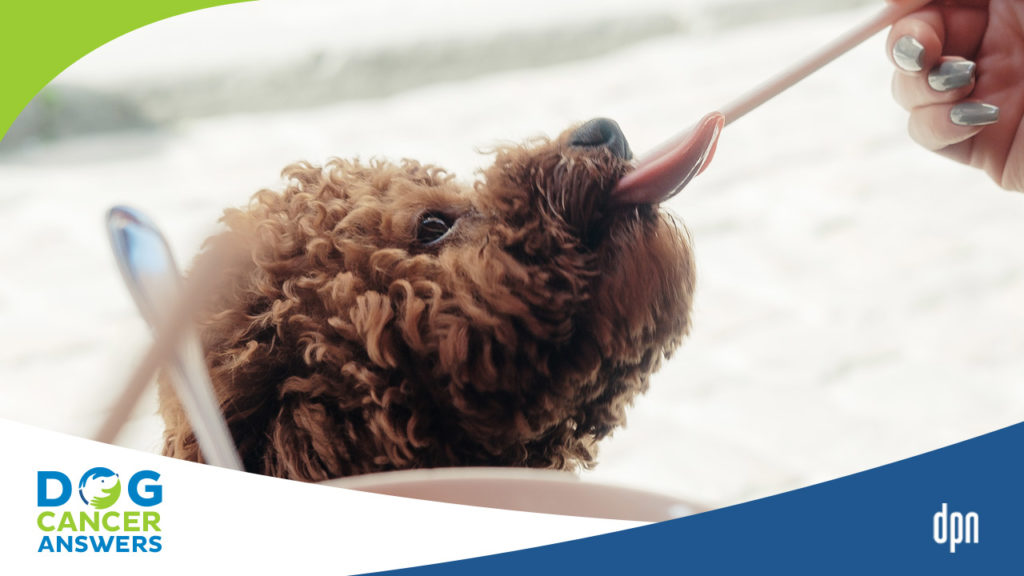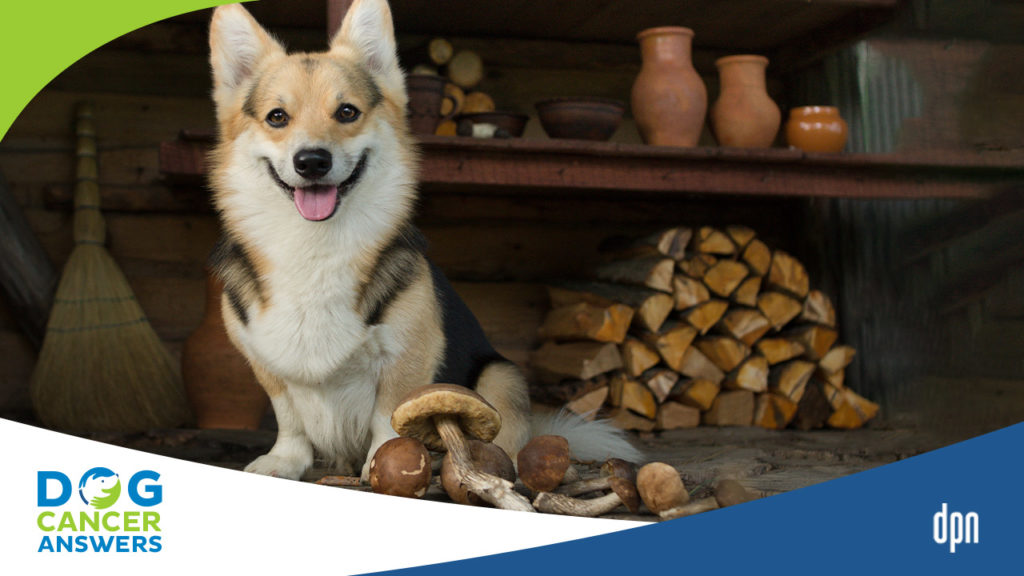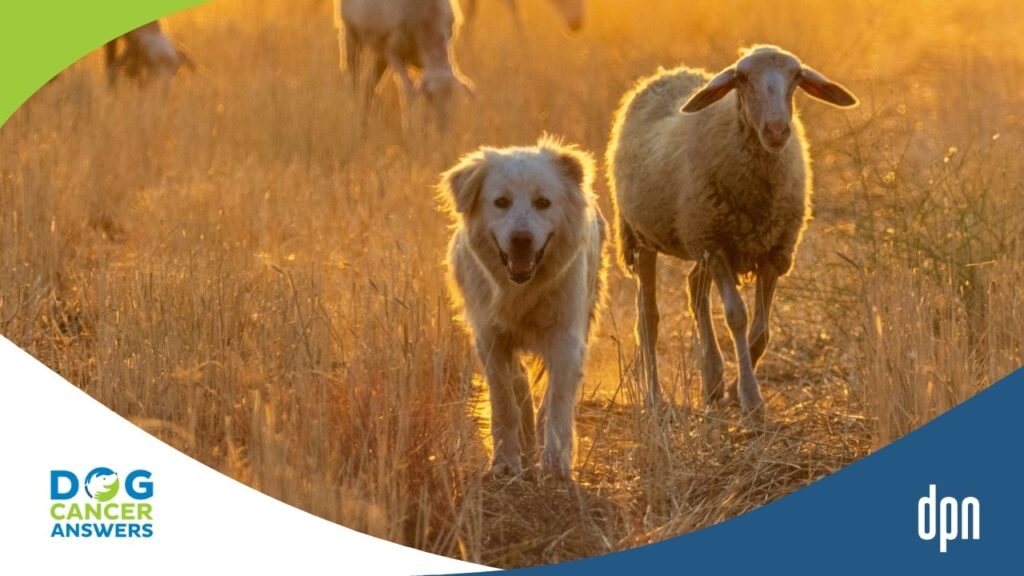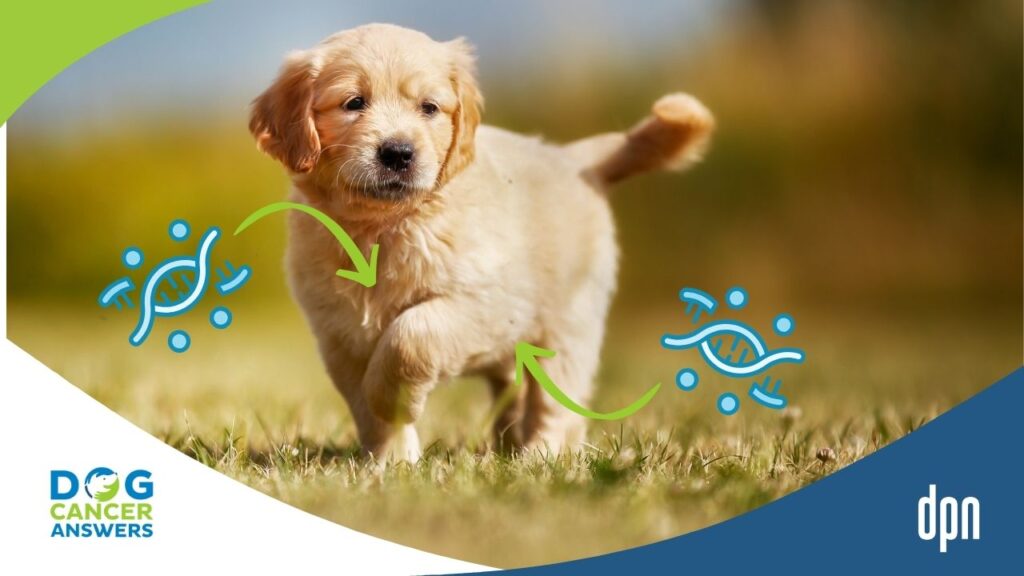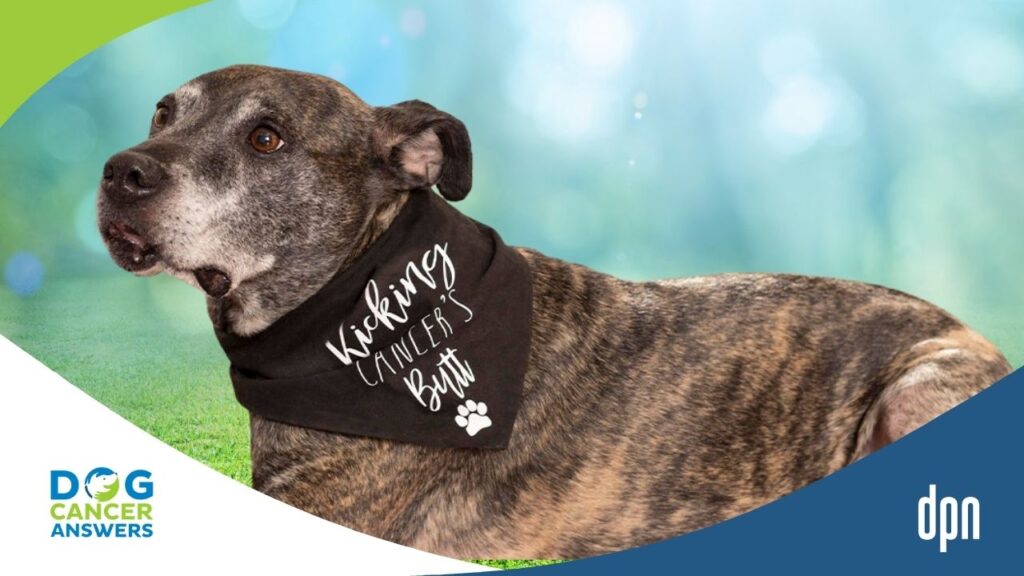EPISODE 69 | RELEASED July 17, 2020
Leading My Dog’s Cancer Treatment Team │ Lauren Ebbecke True Tail
“You cannot treat your own dog’s cancer,” said the veterinary oncologist. “You’re looking at months,” she said. Lauren respectfully disagreed. Over the next year she gathered her veterinary care team and treated Sage’s squamous cell carcinoma. She also decided bacon-wrapped steak could be a cancer treatment. This True Tail is one for the ages!
SHOW NOTES
Lauren Ebbecke is a dynamic, positive, kind of amazing dog mom in Wisconsin, and her True Tail is truly fascinating. As a science teacher and a wellness coach, she knows a LOT about dog cancer, and she is very generous in this episode.
This episode is sponsored by the excellent book The Dog Cancer Survival Guide: Full Spectrum Treatments to Optimize Your Dog’s Life Quality and Longevity. Lauren used this book as a guide to her dog’s cancer journey, and as the basis for her online course about how to help dogs with cancer.
Lauren Ebbecke’s website is: http://extraordinarywellnesscoaching.com/
Lauren mentioned several supplements, including:
- Yunnan baiyao
- Paul Stamets mushroom supplements: https://fungi.com/
- Apocaps CX: https://apocaps.com
- EverPup: https://everpup.com
- Artemix or artemisinin, which is discussed at length in chapter 12 of The Dog Cancer Survival Guide by Dr. Dressler
Lauren mentioned the importance of Cheat Days, and emotional management which you read more about in chapter 2 of his book.
The restaurant that made special Cheat Day dinners for Sage, including her last meal is the Silver Birch Supper Club in Tomahawk, Wisconsin. https://silverbirchsupperclub.com/
And finally, Lauren’s new dog, Tito, is named after this dog-loving vodka: https://www.titosvodka.com/
[00:00:00] >> Announcer: Welcome to Dog Cancer Answers, where we help you help your dog with cancer. Here’s your host, James Jacobson.
[00:00:15] >> James Jacobson: Hello friend. How are you today? We have got a really interesting show for you today. It’s part of a new series that you will hear from time to time here on Dog Cancer Answers. It’s something we are calling True Tails. T A I L S. True Tails. In this Two Tails episodes, we’re not speaking with veterinarians like we normally do. Instead, you’ll be hearing from fellow listeners of this podcast and readers of The Dog Cancer Survival Guide book who will share their own stories and perhaps inspire and encourage you in your dog cancer journey.
[00:00:52] So today, to kick off this occasional series, we’re talking to Lauren Ebbecke, a science teacher and wellness coach from Wisconsin. She has trained as an EMT and as an herbalist. Lauren doesn’t just know dog cancer from being a dog mom. She’s an educator, a science instructor at Mid-State Technical College in Wisconsin, who felt that she had to educate herself, and now she’s teaching other dog lovers how to maneuver when they’re fighting dog cancer. Lauren, welcome to the show. Thank you for being here with us today. Tell us a little bit about your dog cancer journey and how it started.
[00:01:32] >> Lauren Ebbecke: I had a lab named Sage and she was about 75 pounds yellow lab. I picked her up in 2005 as a puppy. And then two years ago, actually three years ago, I noticed her abdomen was really large. And so I ended up taking her in and having her x-rayed and I was at work and they called me and they said, she’s got a tumor, the size of a bowling ball in her spleen. So my first reaction was, oh my God, I’m dealing with hemangiosarcoma.
[00:02:01] >> James Jacobson: Now, how did you know that you were dealing with hemangio? Did you have some sort of background?
[00:02:05] >> Lauren Ebbecke: Well, I’m a scientist first and I have to stress that because I know a lot of medical stuff. I took cellular biology from Western Kentucky University, but I was in all classes with doctors. It was a pre-med program and I took a cancer course for six months. So I had that background and then I’ve just been dealing with dogs. Sage was my third lab. So.
[00:02:26] >> James Jacobson: Okay. So when they said spleen, you said, must be hemangio?
[00:02:29] >> Lauren Ebbecke: Yes. And hemangiosarcoma was something I had actually had been on a naturopathic dog site. And I was reading about that ahead of time, just for kicks, because I do that.
[00:02:39] So I teach about dogs are smaller, in my view, smaller human beings. And so I’d use them a lot in my teaching when I’m doing anatomy and physiology, but the long story short of it was I finally took her to my local vet and said, you’ve got to take this out. And he said, I don’t have a blood supply and she might die.
[00:02:55] And I said, I don’t have $10,000 today. I said, so if it’s meant to be, it’s meant to be, just do it. And he was like, all right. So he put her asleep and he called me right away and said, come in here, can you see your dog intubated? And I’m like, oh yes, I’ve been an EMT. I teach all this. But he showed me back of her throat and I started crying ’cause it looked like she had cancer on her throat and I said, that’s gotta be cancer. And he said, you don’t know this, let us just go through the surgery. So I said, okay. So he went through because they had originally said they found any other cancer, they’d put her down.
[00:03:25] >> James Jacobson: Right.
[00:03:25] >> Lauren Ebbecke: So he went through with the surgery, brought out the tumor, sent it off and then called me the next day. And I picked her up already and said, it’s not cancerous. It’s benign.
[00:03:34] >> James Jacobson: Wow.
[00:03:35] >> Lauren Ebbecke: And I went, whoa. And all this time, I’m thinking the dog has had hemangiosarcoma. So I’ve been treating her with Chinese herbs for that, and been working with Chinese herbalist in the area and a Chinese vet. So then I run her to Madison.
[00:03:48] >> James Jacobson: But the Chinese medicine vet, that’s not the one who did the surgery, obviously.
[00:03:52] >> Lauren Ebbecke: No, my vet was great. And so I’m working with two different vets at this point. In fact, I think I was working with three, so two holistic vets and then my local vet. So just because he’s local and the other two weren’t.
[00:04:04] >> James Jacobson: Okay. Basically you’re coordinating with a team of three vets.
[00:04:07] >> Lauren Ebbecke: Yes.
[00:04:09] And I’m trying to treat the dog for what I think, hemangiosarcoma. But you know, she’s getting tumeric and she’s getting vitamin A and D about 0.5 mils, which isn’t gonna kill her. And I was using a special Yunnan Baiyao. This is a Chinese herb. And this stops bleeding on the spot.
[00:04:26] This was my lifesaver for the entire year I was dealing with all of this, but I ran her to Madison ’cause I said, you got to do a biopsy and only Madison could do it. So I run her to UW Madison and the vet there does a biopsy and goes, I hate to tell you this, but your dog has squamous cell carcinoma in the throat and it’s aggressive.
[00:04:44] And I’m like, really? And they’re like, yeah, you’ve got to start, you know, chemo. You’ve got to start radiation. You’ve got to do, and the dog is 12 and I’m going, I’m not gonna do this. And this is of course has quoted me all these prices and I said, I’m going back to my holistic vets, I’m going back to make your own food. I’m going back to, and as you can know, I mean, I’m really distraught at this point.
[00:05:05] >> James Jacobson: Sure. But you seem like pretty level headed at the same time.
[00:05:08] >> Lauren Ebbecke: I am. Because I had this vet from UW saying to me, you can’t do this. You cannot treat your own dog. You can not feed. You can not make food. It doesn’t meet the guidelines.
[00:05:18] And I said, lady, I know you’re knowledgeable. I said, I honor your degree. I said, I’m gonna tell you right now. I said, I am extremely knowledgeable. I do my homework to the nth degree. And I said, I trust my education and I can do this. And I took my dog and walked out.
[00:05:33] >> James Jacobson: And what did she say to that?
[00:05:35] >> Lauren Ebbecke: She just told me that I was looking at a death sentence and that the dog was not gonna make it to December. And this would have been like the end of October, beginning of November.
[00:05:43] >> James Jacobson: And was this an oncologist or was this a general practice vet?
[00:05:47] >> Lauren Ebbecke: It was an oncologist out of Madison. They’re the ones who do the diagnosis and stuff. And my vet sent me to her to find out exactly what we were dealing with. And Sage had no other cancer anywhere else in our body because we had checked on that and made sure of that.
[00:05:59] >> James Jacobson: So no hemangio, just squamous cell that was located in the.
[00:06:02] >> Lauren Ebbecke: Yep. Right in the throat. Yeah.
[00:06:05] And so I came back and I started my research immediately and had discovered Dr. Dressler’s book, which was phenomenal. And I read it from cover to cover and started immediately following the guidelines. I started making all of my own food, using turkey. And actually again, with the Chinese vet, she was like, make sure you’re using turkey and make sure you’re using rabbit because you need cool meats because the dog is hot, ’cause she pants a lot and runs. So I was following her and she was recommending mushrooms. And so I was following Paul Stamets’ mushroom supplements, and then Dr. Dressler also recommends mushrooms. And then I found a local man who actually would take his mycelium and grind it up for me cause he wanted to see if it would work.
[00:06:47] So I’d have ground mycelium that I could take and just put right in the food.
[00:06:51] >> James Jacobson: What’s mycelium?
[00:06:52] >> Lauren Ebbecke: That’s the, when the mushroom first tends to start sporing and start growing. So when it first comes out, it’s called mycelium.
[00:06:58] >> James Jacobson: Baby mushroom spores.
[00:06:59] >> Lauren Ebbecke: Basically baby, baby mushrooms. And that’s what Stamets uses when he crushes up or creates this. You grow it and it starts off as mycelium and that spreads in the ground before it becomes the mushroom. And it’s real easy to grind it up and stuff. And so before I started using his well, actually I started using this and then I started using that one just to test it because the gentleman wanted to help me out.
[00:07:20] >> James Jacobson: Right.
[00:07:20] >> Lauren Ebbecke: ‘Cause he loved what I was doing. I’d go to the local farmer’s market and buy organic rabbit and organic turkey.
[00:07:25] >> James Jacobson: Because they were cool meets to cool down your dog.
[00:07:28] >> Lauren Ebbecke: Yes.
[00:07:29] >> James Jacobson: And again, it’s definitely a Chinese medicine.
[00:07:31] >> Lauren Ebbecke: Yes.
[00:07:32] >> James Jacobson: Perspective because I’m sure.
[00:07:33] >> Lauren Ebbecke: Yes.
[00:07:34] >> James Jacobson: The vet, meat’s meat, right? Protein’s protein.
[00:07:36] >> Lauren Ebbecke: Yes. Yes. And then of course I use the kale and sometimes I used oatmeal. But I followed Dr. Dressler’s formula to the T and I would do my red peppers and my kale. And you have to steam them because dogs normally don’t digest raw vegetables very well. So you have to steam them down.
[00:07:54] >> James Jacobson: And Sage never ate so well, I bet.
[00:07:56] >> Lauren Ebbecke: Oh, she loved it. Yeah. And then when I.
[00:07:59] >> James Jacobson: But before any of these she was probably like.
[00:08:00] >> Lauren Ebbecke: Oh yes.
[00:08:01] >> James Jacobson: She’s eating dog food, right?
[00:08:02] >> Lauren Ebbecke: Yes. And then for her cheat days, you know, Dr. Dressler talks about, you got to have those cheat days for your dog. And one of the biggest things I should point out, Dr. Dressler pointed out in the very beginning, that was so helpful in his book that you’ve got to get control of your emotions because we all, when we first hear the cancer word, we think death and we start bawling and our animals pick up so quickly on those emotions.
[00:08:28] And so that helped me tremendously because I would go away like, I’d go run five miles and I’d be crying the whole five miles and I’d come home with a big smile on my face and say, Hey, Sage. How are you? And take her for a walk and play with her. And then on her cheat days, I would actually take her to, and I know people will laugh at me for this, but I’d go to expensive restaurants and I’d go Sage’s favorite thing is steak wrapped in bacon. And I had a supper club that would always do a Tenderloin wrapped in bacon. They’d cut it up really, really fine. And this was a Silver Birch Supper Club in Tomahawk, and they’d put mushroom gravy on it for her and I’d bring it out and serve her.
[00:09:07] >> James Jacobson: And she was very happy to go to that restaurant, I’m sure.
[00:09:09] >> Lauren Ebbecke: She was.
[00:09:09] >> James Jacobson: Sure. Did she tip well?
[00:09:11] >> Lauren Ebbecke: She did. She tipped very well.
[00:09:14] >> James Jacobson: I bet she got all the service there.
[00:09:15] >> Lauren Ebbecke: Yes. And that was actually one of her, that was her last meal two days before she passed. So.
[00:09:21] >> James Jacobson: So how long did Sage thrive?
[00:09:23] >> Lauren Ebbecke: She thrived nine more months. She thrived all the way, but beyond her birthday, beyond her 13th birthday. And it wasn’t actually the cancer. One of the things I did with my vet, my local vet, he would look at me and say, Lauren, I’m not an herbalist. And I’d say, I don’t need you to be. What I need for you to do is to test her blood and tell me where all the enzymes are and just give me all her data on the blood. I said, I’ll know how to adjust what I’m giving her. I said, just give me that. And in the beginning they wanted to put her on prednisone. And I said, no.
[00:09:57] And so I’ve got to tell dog lovers about this because what actually ended up killing her was not the cancer. She got myositis because her immune system attacked the muscles where the cancer was. And it basically.
[00:10:08] >> James Jacobson: In the jaw.
[00:10:09] >> Lauren Ebbecke: Yeah. Gave her a lock jaw, basically. And so it was like May 5th or 6th. It was a Sunday and she started getting worse. And I started her on the prednisone because I realized what had had. But it was almost too late. And you’ll know when it’s time, because like I knew my dog went to the closet, curled up in the corner and gave me the look and she had never done that before. And so when they do that, it’s just a, oh my God, this is going to be it. And so.
[00:10:36] >> James Jacobson: I’m done mom.
[00:10:36] >> Lauren Ebbecke: Yeah. And on a Sunday I called my local vet and I said, you know, I’m not gonna be able to get off work tomorrow. And I don’t want to take her to emergency. I need for you to put her down. And he’s like, we just did a check. Are you sure about this Lauren? He goes, that cancer hasn’t grown. It hasn’t gone anywhere because they looked at the cancer and I said, I am absolutely sure.
[00:10:56] And you’ll see when I bring her in. And so I brought her into the vet’s office that day and he put her down for me. And even when I walked in, he said, are you real sure? And I said, yes. I said, you will see this. I promise you. So he puts her down and then he goes, can I open up he mouth and look at the, and here I am bawling, right?
[00:11:14] And he’s like, can I open up the mouth and look at the cancer? And suddenly all tears stopped. And I looked at him and I go, go ahead and try. And he goes to open her mouth and he goes, oh my God, Lauren. And I said, yes, she has lock jaw because of those muscles, she has myositis. That’s what killed her.
[00:11:30] >> James Jacobson: So again, it wasn’t the cancer.
[00:11:31] >> Lauren Ebbecke: No.
[00:11:32] >> James Jacobson: It was the effects from the surgery.
[00:11:34] >> Lauren Ebbecke: Yeah. It’s her immune system attacking that lovely, wonderful area there.
[00:11:39] >> James Jacobson: And your takeaway as it relates to prednisone?
[00:11:41] >> Lauren Ebbecke: Well, I would have loved to have started around prednisone, in hindsight, a lot earlier to see if I could have prolonged her life, but you can’t do those what ifs to yourself. You know, you just can’t do that.
[00:11:52] We do the best we can handling what we can with the knowledge we have.
[00:11:56] >> James Jacobson: So that whole odyssey that you went through with Sage sounds so extraordinary, and you are just an incredible model for how to thrive after your dog gets diagnosed with cancer. And the cool thing is I understand you have taken that passion and are empowering other people with that.
[00:12:15] >> Lauren Ebbecke: I am.
[00:12:17] >> James Jacobson: What is that? You’re holding up something that our listeners can’t see.
[00:12:21] >> Lauren Ebbecke: This is a brochure. So this is a brochure that we put together. We put together a continuing education class because I felt the need to try to teach other people about don’t panic. You got to control your emotions and to talk about cancer, ’cause not a lot of people understand cancer.
[00:12:37] A lot of people like to point it to one thing like, you’ll see, people will say, oh, it’s the rabies vaccination or it’s this. And it’s really not. It takes four to seven, what I call hits or mutations to actually become cancer. So the course is an informative canine cancer course to help participants learn, to make confident choices.
[00:12:55] And the topics that I was covering is what cancer really is the different types of cancers that the dog could get, emotions and positive coping strategies, like positive coping strategies. The breathing, the meditation that Dr. Dressler teaches. Treatment strategies. Methods of care. Dieting for the dog, and then how to work with an entire care team so that if you’re working with holistic vet and your regular vet, and I think what people need to know is you’re the one in charge.
[00:13:25] You call the shots. You got a vet like I did at UW Madison, who says you can’t do this. You have the right to walk away and go get another vet. Make sure your care team is behind you.
[00:13:35] >> James Jacobson: That’s such an important message because, as Dr. Dressler talks about in The Dog Cancer Survival Guide, you are the coordinator, you’re your dog’s chief medical officer in the end.
[00:13:45] >> Lauren Ebbecke: Exactly.
[00:13:46] >> James Jacobson: Let’s talk more about your class in a minute, but this is probably the perfect time to stop and take a little break and hear from our podcast sponsor, best-selling animal health book Lauren’s been talking about using with her dog, Sage, The Dog Cancer Survival Guide by Drs. Demian Dressler and Sue Ettinger, who are both frequent guests on this show.
[00:14:08] Dr. Dressler wrote The Dog Cancer Survival Guide because he couldn’t tell his clients everything they needed to know about dog cancer in a 15 or 30 minute appointment. And he wanted to empower them to help their dogs at home, just like Lauren helped to Sage. The Dog Cancer Survival Guide is full of practical advice that tackles every aspect of dog cancer care.
[00:14:32] Dr. Dressler’s five steps to full spectrum cancer care include everything from conventional treatments to supplements, to diet, to lifestyle and mind, body treatments, and perhaps most importantly, Dr. Dressler and Dr. Ettinger, encourage those of us coping with dog cancer to stop, take a breath and learn before we decide The Dog Cancer .Survival Guide is available everywhere that fine books are sold, both in paperback and in e-book editions.
[00:15:02] And if you’d like to help support us and our work here at Dog Cancer Answers go to DogCancerBook.com and you can get the book at a discount by buying it direct from the publisher. The e-book is under $10 and if you get the paperback, they are for free shipping, anywhere in the United States. To get your 10% discount, use the promo code PODCAST when you check out at the website, DogCancerBook.com. Again, the promo code is PODCAST and the website is DogCancerBook.com. Save 10%, support the show, and continue your dog cancer education.
[00:15:43] We’re back. We’re speaking with Lauren Ebbecke. Tell us a little bit about this class that you’re teaching, or actually tell us a little bit about the students and what impact the classes had on them.
[00:15:54] >> Lauren Ebbecke: I had couple of students and the biggest impact, I think the biggest takeaway is that students, they realize that one, they have to get control of their emotions. It’s not exactly a death sentence and two, they’re the leader of their care team, so to speak and they’ve got to get a good care team. So those were two big takeaways. And then I think what was third big takeaway is a lot of people go make my dogs food, and I’m like, it’s not as hard as it looks. You know.
[00:16:23] >> James Jacobson: So I know you have a new dog named Tito, who is two years old now.
[00:16:26] >> Lauren Ebbecke: Yeah.
[00:16:26] >> James Jacobson: Are you doing anything different with Tito to make sure that he has the best chances for a cancer-free life?
[00:16:32] >> Lauren Ebbecke: You know, one of the things that I teach and that I stress, and I understand the cost folks, but raw diet is the way to go actually with our pups because the kibble, and I don’t care what kibble it is, it’s heated to over 400 degrees and it has two metabolites then that cause cancer in it. And we know this. We know this. And so I just do not trust dried kibble. Now having said that, Tito does get partial dried kibble because he gets those big bags of Stella & Chewy’s, the patties of raw dog food. It’s only six meals and it’s like $32, right?
[00:17:10] >> James Jacobson: And not every dog can have steak wrapped in bacon every day?
[00:17:12] >> Lauren Ebbecke: Exactly. And he can’t have steak every night. And so I do a half and half and I make sure that the dog food has taurine in it because that’s highly important. I just make sure that he gets that raw diet in between and has the raw bones and things. And he gets his supplements too. Like I make sure he has his omega 3’s, without a doubt, ’cause that’s a big one.
[00:17:32] >> James Jacobson: Awesome.
[00:17:33] >> Lauren Ebbecke: The name of the supplement, there’s one that Dr. Dressler recommends that you can buy for your dog ahead of time.
[00:17:38] >> James Jacobson: EverPup?
[00:17:38] >> Lauren Ebbecke: Yes. EverPup. Thank you. I was trying to think it was something pup. I want to say evergreen. EverPup. And it’s fantastic.
[00:17:45] >> James Jacobson: And Tito likes the taste of it?
[00:17:46] >> Lauren Ebbecke: Oh my God. He loves it. He loves it. But those things are important. And then more importantly, when I cleaned the floors and cleaned my house, I have been very careful about what I select and most of it’s gonna be nature oriented. Most is gonna be that natural vinegar, for example, to clean the windows, even the floors, I choose a very natural product. Or I make my own because I’m not willing to expose him, like with Sage I didn’t think about those things. Once you’ve had a dog with cancer, you really begin to think about those things.
[00:18:16] >> James Jacobson: You do. And it sounds like Tito is eatin; well and living a great life. Lauren, it has been a delight talking to you and learning about your successes with Sage and how you’ve helped so many other people. Thank you for being with us today.
[00:18:30] >> Lauren Ebbecke: You’re welcome.
[00:18:31] >> James Jacobson: Anyone fighting dog cancer knows that sometimes you just feel alone. I hope hearing from Lauren today makes you feel a little less lonesome with your dog’s cancer. If you’ve got your own true tale to share, reach out to one of our producers via our website at DogCancerAnswers.com. Lauren mentioned dozens of resources and ideas that warrant links in our show notes.
[00:18:57] So please check out the notes for this episode, for the names of supplements and links to her website, and many articles on Dog Cancer Blog that addressed some of the issues that Lauren talked about with such heart and clarity. You can find the show notes in your podcast app or at DogCancerAnswers.com where you can also download and listen to our entire back catalog.
[00:19:21] And if you liked the show, please subscribe. Also share it on social media. Tell your friends and veterinarian or anyone who might find this show valuable. The more ratings and shares and reviews and listens and subscriptions we get, the higher we’re ranked in that algorithm, and the more likely other dog lovers are to find us just when they really need us.
[00:19:45] If you’ve got a great care team like Lauren does, maybe your personal veterinarian is something to share that’s important. They could be a great candidate for a guest slot on this show. All they have to do is contact one of our producers via our website.
[00:20:00] And those touchstones remind us that veterinarians are on call for you on our listener line. If you have a question for a dog cancer vet, please call our listener line and tell us all about it. We’ll send it to one of our veterinary experts. After that, your question and the answer will appear on a future episode of Dog Cancer Answers. The telephone number is (808) 868-3200. Or visit our website at DogCancerAnswers.com.
[00:20:39] We’d like to once again, thank our sponsor, The Dog Cancer Survival Guide book by Dr. Demian Dressler and Dr. Sue Ettinger. It is available both online and in brick and mortar stores. And remember getting that book also supports this podcast. You can get it directly from the publisher via the website, DogCancerBook.com and use the promo code PODCAST for 10% off. And it’s www.DogCancerBook.com.
[00:21:11] Heartfelt thanks to Lauren Ebbecke for being our guest today and sharing her incredible True Tail about Sage’s fight with squamous cell carcinoma. Hey, give Tito a cuddle and little piece of steak wrapped in bacon from all of us, Lauren. Until next time. I’m James Jacobson from all of us here at Dog Cancer Answers and Dog Podcast Network, I wish you and your dog, a warm, Aloha.
[00:21:38] >> Announcer: Thank you for listening to Dog Cancer Answers.. If you’d like to connect, please visit our website at DogCancerAnswers.com or call our listener line at (808) 868-3200. And here’s a friendly reminder that you probably already know, this podcast is provided for informational and educational purposes only. It’s not meant to take the place of the advice you receive from your dog’s veterinarian.
[00:22:01] Only veterinarians who examine your dog can give you veterinary advice or diagnose your dog’s medical condition. Your reliance on the information you hear on this podcast is solely at your own risk. If your dog has a specific health problem, contact your veterinarian. Also, please keep in mind that veterinary information can change rapidly, therefore, some information may be out of date. Dog Cancer Answers is a presentation of Maui Media in association with Dog Podcast Network.
Hosted By
SUBSCRIBE ON YOUR FAVORITE PLATFORM
Topics
Editor's Picks
CATEGORY


